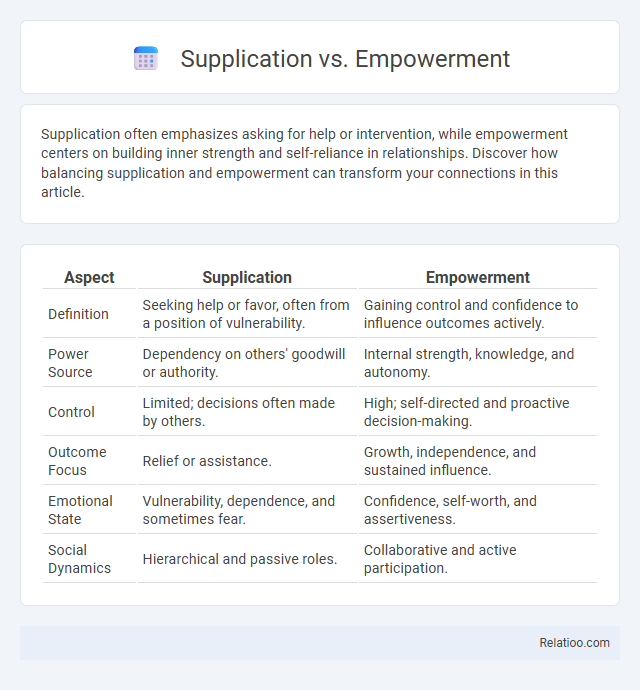Supplication often emphasizes asking for help or intervention, while empowerment centers on building inner strength and self-reliance in relationships. Discover how balancing supplication and empowerment can transform your connections in this article.
Table of Comparison
| Aspect | Supplication | Empowerment |
|---|---|---|
| Definition | Seeking help or favor, often from a position of vulnerability. | Gaining control and confidence to influence outcomes actively. |
| Power Source | Dependency on others' goodwill or authority. | Internal strength, knowledge, and autonomy. |
| Control | Limited; decisions often made by others. | High; self-directed and proactive decision-making. |
| Outcome Focus | Relief or assistance. | Growth, independence, and sustained influence. |
| Emotional State | Vulnerability, dependence, and sometimes fear. | Confidence, self-worth, and assertiveness. |
| Social Dynamics | Hierarchical and passive roles. | Collaborative and active participation. |
Understanding Supplication: Definition and Origins
Understanding supplication involves recognizing it as a humble request or plea directed toward a higher power, rooted in religious and spiritual traditions across cultures. This practice dates back to ancient civilizations where individuals sought divine assistance for guidance, protection, and blessings. Your awareness of supplication's origins enhances its significance as a foundational act of faith and spiritual connection.
What is Empowerment? Key Concepts Explained
Empowerment refers to the process of gaining control, confidence, and authority over one's own life and decisions, enabling individuals or groups to overcome barriers and achieve their goals. Key concepts include self-efficacy, autonomy, and access to resources, which foster personal growth and social participation. Unlike supplication, which involves seeking help or mercy, empowerment emphasizes active agency and the ability to influence outcomes.
Historical Context: Supplication and Empowerment in Society
Supplication has historically been a crucial aspect of religious and social practices where individuals or groups petitioned authorities or deities for aid, reflecting societal hierarchies and dependence. Empowerment, emerging prominently in modern social movements, shifts this dynamic by encouraging agency and self-determination, challenging traditional power structures. The interplay between supplication and empowerment reveals evolving relationships between authority and individual autonomy throughout history.
Psychological Impact: Supplication vs Empowerment
Supplication often leads to a psychological state of dependency and reduced self-efficacy, where individuals may feel powerless and reliant on external sources for help. Empowerment, in contrast, fosters a sense of control, confidence, and intrinsic motivation, enabling Your ability to address challenges proactively. The psychological impact of empowerment significantly enhances resilience and promotes mental well-being more effectively than supplication.
Cultural Perspectives on Asking vs Asserting
Cultural perspectives shape how individuals approach supplication and empowerment, influencing whether asking for help or asserting oneself is valued. In collectivist societies, supplication often reflects respect and interconnectedness, while empowerment emphasizes self-assertion and autonomy more common in individualistic cultures. Your understanding of these cultural nuances can enhance communication and foster better interpersonal relationships across diverse contexts.
Language of Supplication: Words and Phrases
The language of supplication centers on humble, respectful words and phrases such as "please," "I beseech," and "grant me," which emphasize vulnerability and earnestness in asking for help or favor. Empowerment language, in contrast, uses assertive and confident expressions like "I choose," "I am capable," and "I will," highlighting autonomy and self-determination. Your choice of words fundamentally shapes whether your communication reflects supplication's deference or empowerment's strength.
The Path to Empowerment: Strategies and Examples
The path to empowerment involves adopting strategies such as setting clear goals, fostering self-confidence, and practicing active decision-making. Unlike mere supplication, which relies on external aid or prayer, empowerment emphasizes internal strength and proactive behavior to overcome challenges. Examples include mentorship programs, skill-building workshops, and assertive communication techniques that cultivate personal growth and autonomy.
Supplication in Relationships: Risks and Consequences
Supplication in relationships often leads to an imbalance of power, where one partner consistently seeks approval or validation, risking a loss of self-respect and autonomy. This dynamic can result in emotional dependency, decreased self-esteem, and hinder personal growth. Understanding the dangers of supplication helps you foster healthier, more empowering interactions grounded in mutual respect and equality.
Empowerment in Practice: Real-Life Success Stories
Empowerment in practice demonstrates transformative impacts, where individuals harness confidence and resources to overcome adversity and achieve personal goals. Real-life success stories reveal how empowerment fosters resilience, enabling You to break barriers in education, career growth, and community leadership. Unlike supplication, which relies on external aid, empowerment centers on self-efficacy and proactive decision-making that drives sustainable change.
Choosing Empowerment Over Supplication: Actionable Steps
Choosing empowerment over supplication shifts your focus from passively asking for help to actively taking control of your circumstances through deliberate actions and mindset changes. Empowerment involves setting clear goals, building confidence, and developing skills that enable you to influence outcomes, whereas supplication often relies on external intervention without personal initiative. To embrace empowerment, prioritize self-awareness, proactive problem-solving, and consistent effort that transforms challenges into opportunities for growth.

Infographic: Supplication vs Empowerment
 relatioo.com
relatioo.com